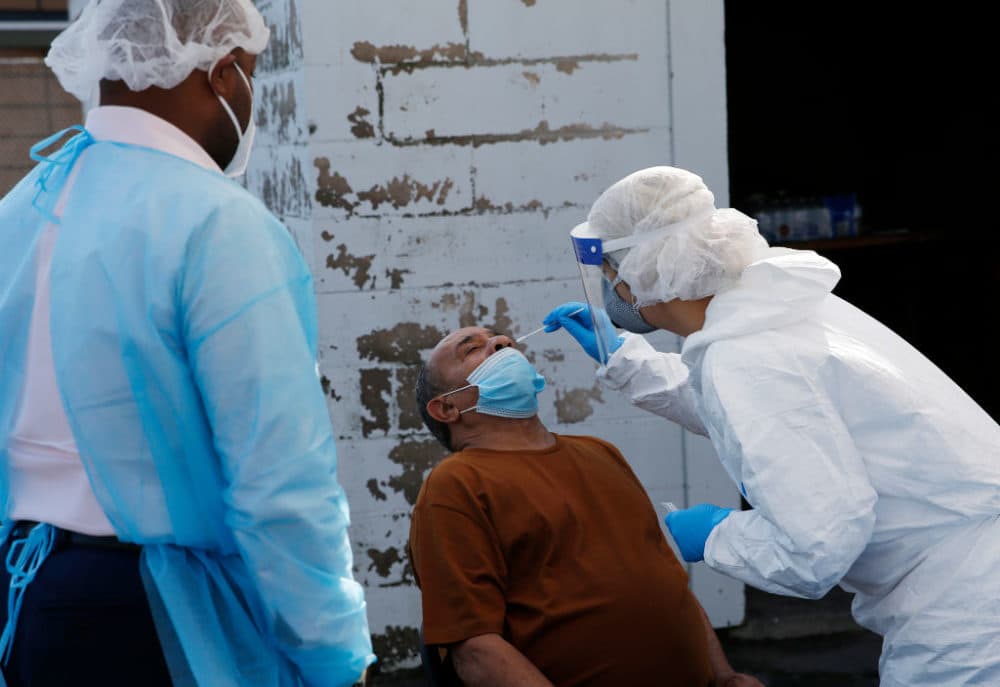Advertisement
Coronavirus Coverage
Concerned About COVID-19 Resurgence, Boston Officials Urge All Residents To Get Tested

There are four sites across Boston where residents can get free coronavirus tests even if they have no symptoms, and Mayor Marty Walsh wants as many people as possible to take advantage of them. In particular, he says, people who have been traveling or socializing in groups.
“Unless you’re in complete isolation and not leaving your home by any circumstances, I encourage everyone to get tested and make it a regular part of your routine,” he says.
At the moment, city testing centers are processing roughly 1,500 coronavirus tests a day. But Walsh wants to push that number to around 2,000 — the city's full current testing capacity. The data, he says, can help health officials develop strategies to stop the spread of the virus at a time when cases appear to be climbing rapidly.
“What we’re seeing here in Boston in the last four or five weeks is this increase in positivity rates,” Walsh says. “We want to get a real accurate count as we think about what the next steps are. Testing is the way we can have a good response to what we’re seeing in the COVID rates.”
The percentage of positive coronavirus tests in Boston was below 3% at the end of September. Last week, it had climbed to 6.2%. Walsh says about half of new cases are among people under the age of 29, and over a third are among the Latino community, according to the city’s COVID-19 dashboard.
City health officials believe many of the infections are linked to house parties, workplaces and transmission between household members. But more testing might help them narrow down where and how these infections are happening.
“It’s going to inform our decisions," Walsh says, "closing certain industries down here in Boston. I’m hoping we don’t have to do that. But unfortunately, if our numbers continue to rise, we will have to take some drastic measures as well, because it’s about keeping people safe.”
Increasing the sheer number of people getting tested will help health officials understand the coronavirus epidemic better, says Harvard epidemiologist Dr. Michael Mina. But unless a substantial portion of Boston’s population begins getting tested regularly, the city will have a hard time stopping the spread using methods like contact tracing, self-quarantining and isolation.
"It will continue to inform public health officials so they can better understand: Do we need to make more rules? Can we lift regulations or put more regulations in place?" Mina says. "But I worry sometimes that people think infrequent testing is a control strategy. It's not. It's an information strategy to keep health officials in the know. Until you're testing large parts of the population pretty frequently — say, every week — you're going to barely find the people you need to find when they're infectious."
There are also only four testing sites in Boston, including two mobile sites, that offer free asymptomatic testing. At other sites, insurance will only cover tests for people who are symptomatic, or who have been close contacts of a person who tested positive. And many people may simply be unable to take the time out of their schedule to get a test regularly, Mina adds.
“It's very inconvenient. You can't expect huge portions of the population to be going through these testing sites," he says. "You have to be putting them on corners and setting up booths."
Walsh says the city hopes to expand coronavirus testing soon and is working with vendors to procure rapid molecular tests. These tests, which detect the viral proteins rather than the genetic material — like the more common PCR test, can provide results within minutes rather than days.
“If we had the ability to have over-the-counter testing, that’s the best scenario,” Walsh says. “We’re going to be living with COVID-19 for some time. I think rapid testing is going to be really important for us to fully reopen businesses, sports entertainment venues, movie theaters and other places.”
